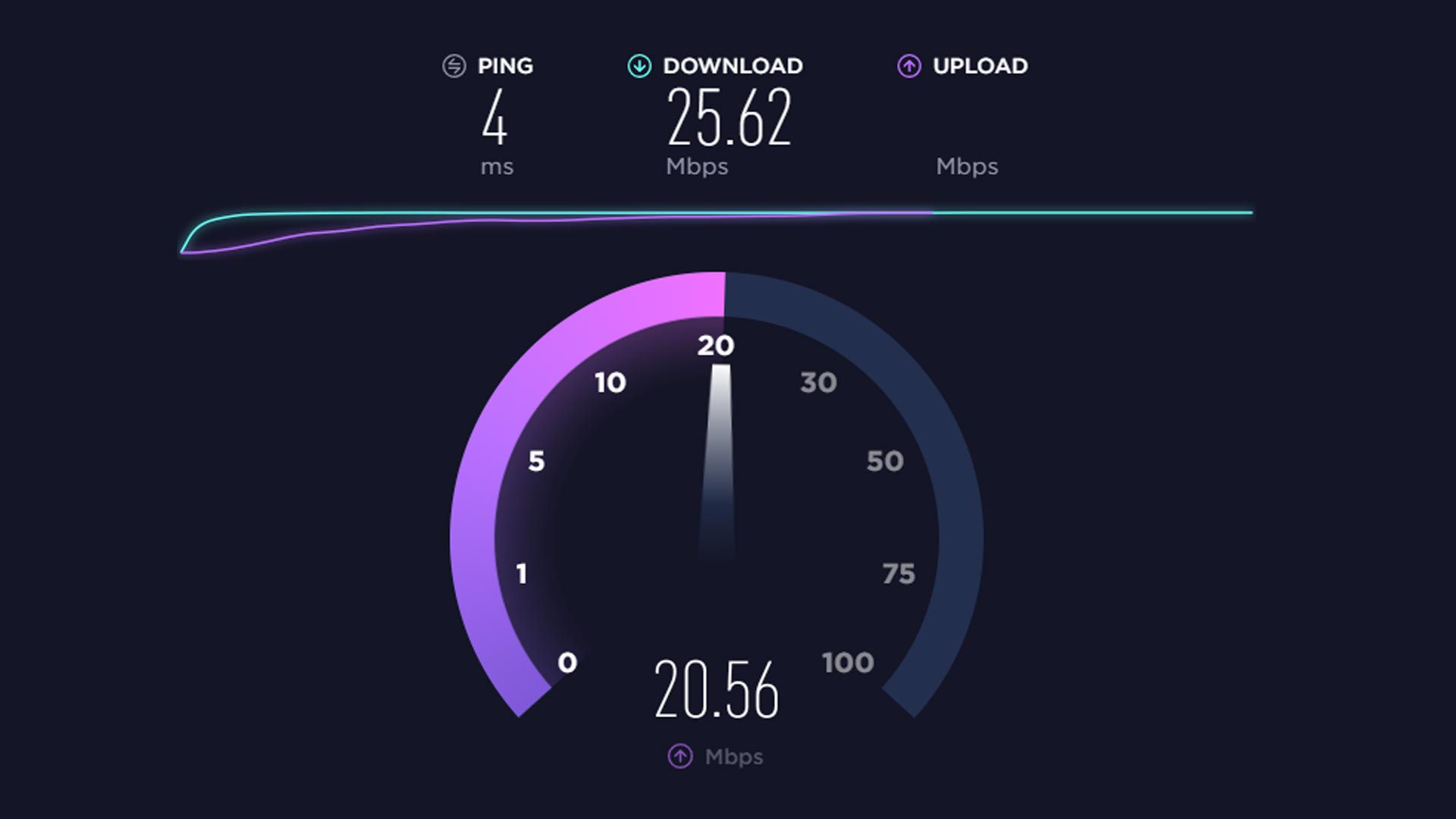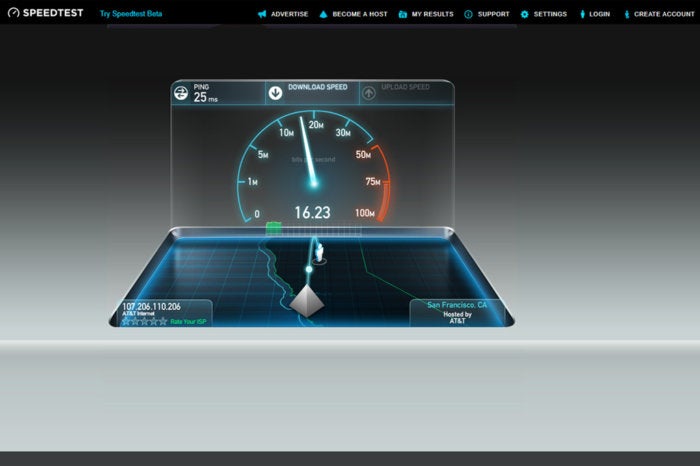My laptop and iPhone download speed were more than 30 times slower than my desktop’s download speed! On the other hand, the upload speed was roughly the same on all devices. Yevgeniy: I ran into your blog post 'Got slow download but fast upload speeds over wireless? Here's a fix.' I have some info you may find useful.
New York's attorney general is suing the second-largest cable operator in the US, claiming the company lied about internet speeds.
Eric Schneiderman filed the lawsuit ( pdf) in Manhattan's State Supreme Court on Wednesday, following a 16-month investigation. The attorney general argues that Charter and its subsidiary, Spectrum, have provided subpar services, with internet speeds slower than the company advertised.
Spectrum had been known as Time Warner Cable before Charter purchased it for about $60 billion, in a deal that was completed in May 2016. Schneiderman wants Charter to pay back its customers for broken promises on internet speeds for a period stretching from Jan. 1, 2012, to today.
With 2.5 million New Yorkers using Spectrum-Time Warner, Charter would have to reimburse customers up to $1 billion for each year since 2012, according to the lawsuit.
In today's connected world, internet speeds matter greatly to consumers for countless everyday activities, from streaming Netflix shows and Spotify tunes to paying bills, doing homework, shopping for shoes and gabbing on social media.
The attorney general's investigation found that Spectrum-Time Warner's speeds were much slower than advertised, with executives ignoring engineers' warnings that the promised speeds were impossible.
Customers paying $110 a month for 300 Mbps, were on average, only getting 85 Mbps, Schneiderman said at a press conference Wednesday. Those paying $70 a month for 100 Mbps were barely getting 50 Mbps. On average, Wi-Fi speeds were 80 percent slower than what customers were promised.
AG: A 'business plan built on deceit'
The investigation found internal emails from the company's executives acknowledging their internet speeds didn't match what they advertised.
'It is a consistent story of bad performance and a long-term business plan built on deceit,' Schneiderman said.
The lawsuit also criticized Spectrum-Time Warner for charging customers $10 a month to rent subpar modems that slowed down internet speeds even more. In internal emails, the company's engineers recommended at least D3 modems, even as Time Warner's executives continued dishing out D2 modems to save costs.
Between May 2012 and February 2016, subscribers paid $600 million in modem fees alone.
Charter said it had made 'significant commitments' to improve Time Warner Cable's services since acquiring the company.
'We are disappointed that the NY Attorney General chose to file this lawsuit regarding Time Warner Cable's broadband speed advertisements that occurred prior to Charter's merger,' the company said in a statement.

Schneiderman's office started looking into slow internet speeds in October 2015, through a survey asking New Yorkers what their actual speeds were compared to what their companies advertised.
'New Yorkers should get the internet speeds they pay for. Too many of us may be paying for one thing, and getting another,' Schneiderman said in December 2015, when he launched the probe.
The attorney general had blasted Time Warner Cable in the past, telling Charter Communications in his letter than the company 'earned the miserable reputation it enjoys among consumers.'
When Charter first acquired Time Warner, Schneiderman warned the company to deal with Time Warner Cable's service issues, including slow speeds.
Originally published at 7:39 a.m. PT.
Updated at 8:39 a.m. PT: Added details from the attorney general's press conference and a statement from Charter Communications.

Tech Enabled: CNET chronicles tech's role in providing new kinds of accessibility.
Does the Mac still matter? Apple execs tell why the MacBook Pro was over four years in the making, and why we should care.
Xbox boss confirms Project Scarlett will have a disc drive: Here's what else we know about the upcoming console, including 8K graphics, 120 fps and SSD.
Watch every E3 video game trailer from Square Enix, Ubisoft, Bethesda and Microsoft's E3 conferences: All the trailers you need to see are right here!
Have you ever noticed that your Internet service provider advertises their speeds as “up to” a maximum speed? You may think you’re paying for a 15 Mbps connection, but you’re actually getting an “up to 15 Mbps” connection that may be slower.
We’ll look at why actual speeds differ from advertised speeds and how you can identify whether you’re actually getting the Internet connection speeds you’re paying for.
Actual vs. Advertised Speeds: Hard Data
Data showing that most people are getting slower broadband speeds than they’re advertised is easy to find. To get this data, all someone has to do is run a speed test on their connection and compare the actual results to the advertised speeds. In most cases, the speeds are slower.
Why Are Upload Speeds Slower
If you’re curious about Internet speeds in the US, you can view the official US government National Broadband Map site and compare “SpeedTest vs. Advertised” to view the difference between actual speed tests and advertised speeds on a map. All the purple and pink dots are slower than advertised, while the light green dots are areas which match their advertised speeds.
The map appear to be primarily dark purple and pink — it’s clear that most people are getting slower speeds than they were advertised. Faster speeds than advertised, which are dark green, are even harder to find.
What Causes Slow Downs
Why Are Download Speeds Faster Than Upload
So why exactly do so few people get the advertised speeds? Well, it’s obviously true that Internet service providers have an incentive to be as optimistic as possible with their numbers, but it’s not just misleading marketing. There are other factors involved:
- End-User Hardware Issues: If you have an old router that just can’t keep up with modern speeds or a poorly configured Wi-Fi connection that’s being slowed down by interference, you won’t actually experience the connection speeds you’re paying for — and that’s not the Internet service provider’s fault.
- Distance From ISP: The further you are away from your Internet service provider’s hardware, the weaker your signal can become. If you’re in a city, you’re likely to have a faster connection than you would in the middle of the countryside.
- Congestion: You’re sharing an Internet connection line with many other customers from your Internet service provider, so congestion can result as all these people compete for the Internet connection. This is particularly true if all your neighbors are using BitTorrent 24/7 or using other demanding applications.
- Time of Day: Because more people are probably using the shared connection line during peak hours — around 6pm to midnight for residential connections — you may experience slower speeds at these times.
- Throttling; Your Internet service provider may slow down (or “throttle”) certain types of traffic, such as peer-to-peer traffic. Even if they advertise “unlimited” usage, they may slow down your connection for the rest of the month after you hit a certain amount of data downloaded.
- Server-Side Issues: Your download speeds don’t just depend on your Internet service provider’s advertised speeds. They also depend on the speeds of the servers you’re downloading from and the routers in between. For example, if you’re in the US and experience slowness when downloading something from a website in Europe, it may not be your Internet service provider’s fault at all — it may be because the website in Europe has a slow connection or the data is being slowed down at one of the routers in between you and the European servers.
Many factors can impact Internet connection speed, and it’s hard to know which is the precise problem. Nevertheless, in real-life usage, you’ll generally experience slower speeds than your Internet service provider advertises — if only because it’s so dependent on other people’s Internet connections.
Measuring Your Internet Connection Speed
You can attempt to measure your Internet connection speed by using the SpeedTest website. Select a nearby server and SpeedTest will establish a connection to it, trying to download the file as fast as it can. It also attempts to upload data, testing your upload speed. This gives you a good idea of the speed your Internet service provider is giving you, as the SpeedTest servers are chosen because they can deliver very fast speeds. Using a nearby server allows you to test a more direct connection, with minimal interference from third-party routers — for example, if you choose a SpeedTest server on the other side of the world, you’ll almost certainly experience slower speeds.
Check your connection speeds at different times, including at peak hours and off. They may fluctuate over time.
If your connection speeds aren’t as advertised, there’s not much you can do. You may be able to upgrade your router or tweak your router’s settings to minimize Wi-Fi interference, but ISPs probably won’t listen to you if you call and assert that you need to be getting a faster speed. The speed is advertised as “up to” for a reason.
Why Are My Download Speeds Slower Than Upload
Image Credit: Matt J Newman on Flickr
READ NEXTMy Upload Speed Is Higher Than Download
- › What’s Going to Happen to Your Huawei or Honor Phone?
- › Will a Smart Plug Pay For Itself?
- › Hardware Security Keys Keep Getting Recalled; Are They Safe?
- › Google Drive and Photos Are Splitting: What You Need to Know
- › Here’s Why iOS 13 Makes Me Want an iPhone